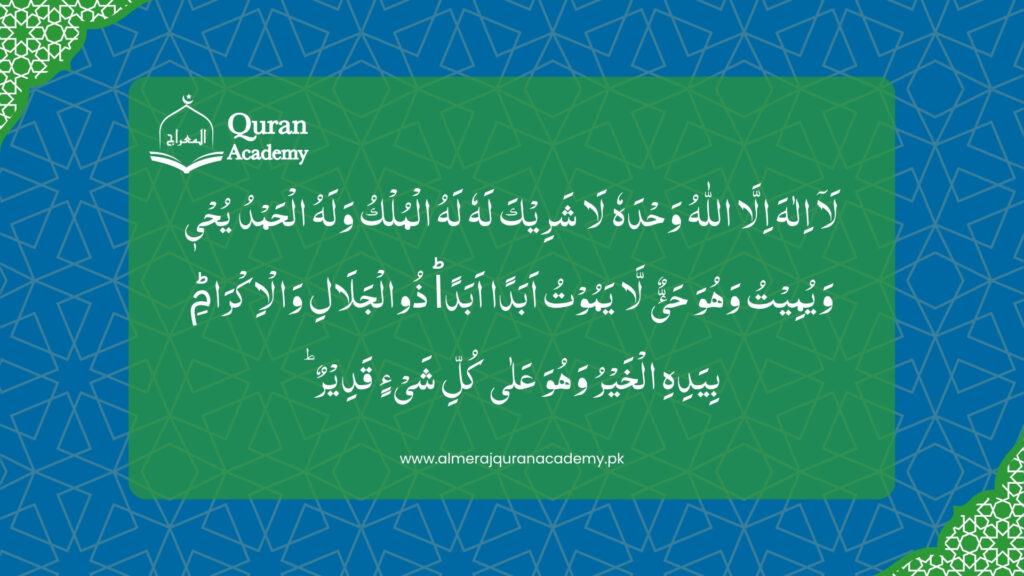Fourth Kalma
Kalima Tawheed
The Fourth Kalima, known as “Kalima Tawheed” (كَلِمَاتْ اَلتَّوْحِيدْ), centers on the concept of Tawheed, which means the Oneness of Allah (سُبْحَانَهُ وَتَعَالَى). This Kalima emphasizes the Islamic belief in monotheism — that Allah alone is worthy of worship, and He has no partners.
It serves as the foundation of Islam’s first pillar, highlighting Allah’s uniqueness using terms like Al-Ahad (The One) and Al-Wahid (The Singular) in Islamic theology. Belief in Tawheed is the first and most essential step in accepting Islam.
The Quran repeatedly affirms this belief across various Surahs and verses, underscoring its centrality to Islamic faith. While the six Kalimas are more frequently taught and memorized in South Asian regions like Pakistan, India, and Bangladesh, their meanings and messages — especially the Fourth Kalima — are cherished and recited by Muslims around the world in various forms.
Tawheed (Word of Oneness)
Laa ilaha illal lahoo wahdahoo la shareekalahoo lahul mulko walahul hamdo yuhee wa yumeeto wa hoa haiy yul la yamooto abadan abada zul jalali wal ikraam beyadihil khair. Wa howa ala kulli shayi in qadeer
(There is) no god except Allah - One is He, no partners hath He. His is the Dominion, and His is the Praise. He gives life and causes death, and He is Living, who will not die, never. He of Majesty and Munificence. Within His Hand is (all) good. And He is, upon everything, Able (to exert His Will)
لَآ اِلٰهَ اِلَّا اللّٰهُ وَحْدَهٗ لَا شَرِيْكَ لَهٗ لَهُ الْمُلْكُ وَلَهُ الْحَمْدُ يُحْىٖ وَيُمِيْتُ وَهُوَ حَئٌّ لَّا يَمُوْتُ اَبَدًا اَبَدًاؕ ذُوالْجَلَالِ وَالْاِكْرَامِؕ بِيَدِهِ الْخَيْرُ وَهُوَ عَلٰى كُلِّ شَىْءٍ قَدِیْرٌ

The Significance of Kalima Tawheed - Fourth Kalma
The Fourth Kalima, also called Kalima Tawheed, centers on the belief in the absolute Oneness of Allah (سُبْحَانَهُ وَتَعَالَى), which forms the core foundation of Islamic faith. The word Tawheed itself means “Oneness,” and by reciting this Kalima, a Muslim declares that Allah alone is the One True God, without any partner or equal. This fundamental belief is also the first pillar of Islam, and rejecting it or associating others with Allah (shirk) is considered a major sin in Islam.
This Kalima is a reminder that everything in the universe is created by Allah, and He alone holds power over all things. The concept is beautifully described in Surah Al-Ikhlas, which emphasizes:
Translation:
Say, ˹O Prophet,˺ “He is Allah—One ˹and Indivisible.
Allah—the Sustainer ˹needed by all.
He has never had offspring, nor was He born.
And there is none comparable to Him.
[Quran 112:1–4]
Kalima Tawheed – Core Beliefs:
Only Allah is worthy of worship — no one else has the right to be worshipped.
Allah is One and Unique — He has no partners, no equals.
Shirk (associating partners with Allah) is strictly forbidden and nullifies faith.
Allah is the Creator and Owner of the universe — including the heavens and the earth.
All praise and glory belong to Allah — He is worthy of all reverence.
Life and death are in Allah’s control — every being’s existence is dependent on Him.
Allah is Ever-Living and Eternal — He never dies.
He holds supreme authority and power — over everything in existence.
Reciting Kalima Tawheed – When & Where?
Kalima Tawheed can be recited anytime and anywhere. Unlike Salah or Fasting, which have fixed timings, this Kalima has no time or place restrictions. Whether you are at home, at work, relaxing, or even visiting a graveyard—as is common in some cultures—this powerful declaration of faith can be recited in any setting. Its purpose is to remind us of Allah’s Oneness, and that reminder is always relevant, no matter the time or place.
How Often Should We Recite Kalima Tawheed?
There’s no limit to how many times you can recite it. Whether once a day or multiple times throughout your routine, every recitation brings immense reward. Though it’s slightly longer than the earlier Kalimahs, with a little effort, it becomes easy to memorize. More importantly, understanding its meaning adds depth to your recitation and strengthens your connection with Allah.
Living the Message of Kalima Tawheed
Making Kalima Tawheed part of your daily spiritual practice transforms your life. It reinforces faith (Imaan), protects against Shirk (associating partners with Allah), and constantly reminds you of your purpose and Creator. The frequent remembrance of Allah through this Kalima nurtures spiritual discipline, awareness, and humility.
The belief in the Oneness of Allah forms the foundation of Islam. Regular recitation reaffirms this truth, guards our belief system, and keeps our hearts aligned with the core message of Islam. In return, Allah promises great rewards, both in this life and the Hereafter.
Benefits of the Kalima Tawheed Based on the Quran and Hadith
The essence of Kalima Tawheed is deeply rooted in the Quran, especially in Surah Al-Ikhlas (112th Surah), which outlines the core belief of Allah’s Oneness. This connection highlights why reciting the Fourth Kalima is so important in Islam.
A powerful Hadith from Sunan An-Nasa’i narrates:
Translation – “Abdullah bin Az-Zubair used to recite the tahlil following every prayer, saying: There is none worthy of worship except Allah (SWT) alone, with no partner or associate. His is the Dominion, to Him be all praise, and He is able to do all things; there is no power and no strength except with Allah (SWT) the Almighty. There is none worthy of worship except Allah (SWT), and we worship none but Him, the source of blessing and kindness and the One Who is deserving of all good praise. There is none worthy of worship except Allah (SWT), and we are sincere in faith and devotion to Him even though the disbelievers detest it. Then Ibn Az-Zubair said: ‘The Messenger of Allah (ﷺ) used to recite the tahlil in this manner following every prayer.'”
[Sunan An-Nasa’i 1340]
Similarly, Hadith 2691 of Sahih Muslim echoes the same belief. These narrations stress the importance of reciting Kalima Tawheed frequently to gain immense spiritual rewards and reinforce the belief in monotheism.

